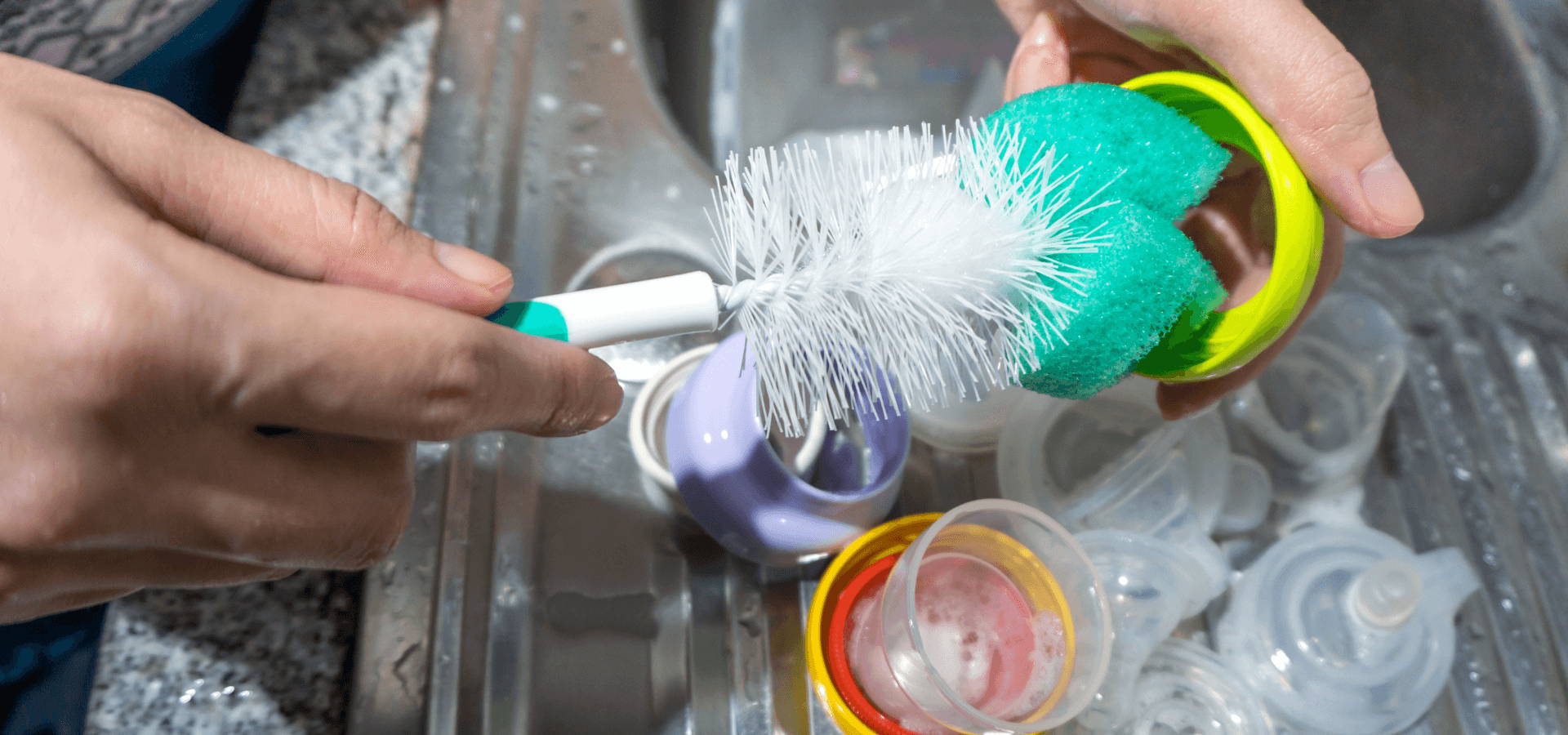EMMA
FEB 10, 2023
9 Amazing Benefits of Breastfeeding For You And Your Baby
Breastfeeding is a natural and beneficial process that provides optimal nutrition for babies and has a multitude of benefits for both the baby and the mother. Breast milk contains all the essential nutrients that a growing baby needs, while also bolstering their immune system, fostering bonding between mother and baby, and supporting healthy growth and development. These benefits of breastfeeding are not only impressive, but they are also essential for a baby's overall well-being.
In this article, we will delve into ten amazing benefits of breastfeeding for both you and your baby. Whether you are a first-time mom or a seasoned pro, this article will provide you with valuable insights into why breastfeeding is such a critical component of your baby's development.

1. Provides Optimal Nutrition for Babies
Breast milk is amazing and is considered the perfect food for babies. It contains all the essential nutrients, vitamins, and minerals that babies need for healthy growth and development, setting them up for a healthy start to life.
One unique aspect of breast milk is its composition of nutrients, which cannot be replicated in formula milk. For instance, breast milk contains proteins that are highly digestible, making it easier for babies to absorb and utilize the nutrients. Breast milk also contains essential fatty acids, including Omega-3 and Omega-6, which are crucial for the development of a baby's brain and nervous system.
One of the many benefits of breast milk is that it's easy for babies to digest, which reduces the likelihood of gastrointestinal problems like constipation and diarrhea. Breastfeeding also helps lower the risk of allergies and chronic diseases later in life, providing long-term health benefits for babies.
2. Boosts Baby's Immune System
Breast milk does much more than just provide nutrition for babies. In fact, it is a powerful medicine that helps protect babies against infections and illnesses. This is because breast milk contains antibodies that help boost a baby's immune system, providing them with a strong defense against a wide range of infections, including ear infections, respiratory infections, and gastrointestinal infections.
Because a baby's immune system is not fully developed at birth, they are more susceptible to infections. However, breastfeeding helps strengthen their immune system by providing them with the necessary antibodies to fight off infections. Research has shown that breastfed babies are less likely to develop infections and illnesses than formula-fed babies.
Breast milk also contains other immune-boosting components, such as white blood cells, immunoglobulins, and lactoferrin. These components help protect babies against bacteria, viruses, and other harmful pathogens, further boosting their immune system.
In addition to protecting against infections, breastfeeding also helps reduce the risk of sudden infant death syndrome (SIDS). SIDS is the sudden and unexplained death of a baby under one year of age, and studies have shown that breastfeeding reduces the risk of SIDS by up to 50%.
3. Promotes Bonding Between Mother And Baby
Breastfeeding is not just about providing nourishment for a baby, it is also a beautiful opportunity for bonding between a mother and her baby. When a mother breastfeeds her baby, she releases hormones such as oxytocin, which helps promote bonding and attachment between the mother and baby.
Skin-to-skin contact during breastfeeding is also a powerful bonding experience. This contact helps the baby feel secure and comforted, and it promotes the release of hormones that help regulate the baby's stress response. This skin-to-skin contact can also be calming for the mother, creating a special moment of closeness between the two.
Breastfeeding can also provide mothers with a sense of connection and confidence in their role as a caregiver. The act of breastfeeding creates a quiet and intimate moment between the mother and baby, which can be a source of comfort and relaxation for both. As mothers continue to breastfeed, they develop a stronger understanding of their baby's needs and cues, which can help them feel more confident in their ability to care for their baby.
4. Supports Healthy Growth And Development
Breastfeeding, a practice that has been around since the dawn of humanity, provides numerous benefits not only for a baby's physical health but also for their cognitive development. Scientific research has demonstrated that infants who are breastfed enjoy superior cognitive outcomes compared to their formula-fed counterparts, as evidenced by higher IQ scores and greater cognitive function.
The reason for this remarkable difference lies in the composition of breast milk itself, which contains vital fatty acids like DHA that are essential for proper brain development. As the brain grows and matures, these critical building blocks help create new neural connections and enhance overall cognitive abilities.
Moreover, breastfeeding confers additional health advantages that extend well beyond infancy. Research has shown that children who were breastfed are less likely to develop a range of chronic conditions later in life, such as obesity, type 2 diabetes, and other ailments.
The benefits of breastfeeding are due in part to the optimal balance of nutrients provided by breast milk, which supports healthy growth and development while also helping to regulate a baby's appetite and metabolism. The unique composition of breast milk can vary based on a mother's diet and other factors, but it consistently offers a complete and ideal source of nutrition for growing infants.
5. Customizable To Baby's Needs
Breast milk is not just nutritionally complete, it is also customizable to meet the specific needs of each individual baby. The composition of breast milk changes over time to adapt to a baby's changing needs. For example, the amount of fat and protein in breast milk increases as a baby grows and requires more calories. When a baby is exposed to a particular germ or virus, the mother's body produces specific antibodies that are then passed on to the baby through breast milk. This helps protect the baby from the specific illness or infection.

6. Convenient And Cost-Effective
The wholesome benefits that breastfeeding offers to your infant's health and development are undeniable. The availability and readiness of breast milk make it a fitting option for feeding your little one. It's hassle-free and doesn't necessitate any prepping of formula or concern over depleting your milk supply. Moreover, breastfeeding eliminates the need for pricey feeding apparatuses, such as bottles, nipples, and formula.
Not only is breastfeeding beneficial for your baby's well-being, but it also works wonders for your wallet. Formula could be a costly alternative, particularly if your baby requires a specific formula due to allergies or other conditions. In contrast, breast milk is gratis and easily accessible. This can be a massive cost savings for families, particularly those on a shoestring budget.
Furthermore, breastfeeding can conserve your precious time and energy. With breastfeeding, there is no need to spend countless hours washing bottles, prepping formula, or heating up milk. This can be a substantial time saver for mothers who are always on the go.
7. Environmentally Friendly
Choosing to breastfeed can help reduce your environmental impact by reducing the amount of waste generated by formula feeding.
Formula feeding requires the production of bottles, nipples, and formula containers, all of which contribute to the waste generated by your household. The manufacturing, packaging, and shipping of these products also require a significant amount of energy and resources.
Breastfeeding, on the other hand, requires no packaging, shipping, or waste. It is a natural and sustainable way to nourish your baby while reducing your environmental impact.
In addition, breastfeeding can help reduce the carbon footprint associated with the production and transportation of formula. Formula production requires the use of resources such as water, energy, and transportation, which can contribute to greenhouse gas emissions and climate change.

8. Helps Mothers Recover From Pregnancy And Birth
When you breastfeed your little one, your body releases hormones that aid in the process of involution. This intricate process facilitates the return of your uterus to its pre-pregnancy size and shape. Moreover, it can also help reduce postpartum bleeding and minimize the risk of complications that may arise after childbirth.
Breastfeeding can also contribute to weight loss and help you shed those extra pounds that you gained during pregnancy. Yes, you heard it right! The act of breastfeeding can burn calories and decrease the amount of fat stored in your body, thus helping you return to your pre-pregnancy weight faster.
So, to sum it up, breastfeeding is not just a way to provide nourishment to your little one, but it can also have a positive impact on your own health. It is a natural and efficient way to help your body heal after childbirth and can aid in your weight loss journey as well. Amazing, isn't it?
9. Promotes Health And Well-Being For Mothers
Breastfeeding, an act of nourishing an infant with maternal milk, has been scientifically proven to provide a multitude of health benefits for the mother. Studies have shown that lactation can significantly lower the risk of developing type 2 diabetes, high blood pressure, and heart disease later in life. This is due to the milk's innate ability to regulate insulin levels within the mother's body, thus mitigating the onset of type 2 diabetes, and potentially managing its effects.
Not only does breastfeeding contribute to a healthier lifestyle, but it has also been linked to reducing the risk of certain types of cancer, such as breast and ovarian cancer. According to research, the duration of lactation further increases the protective effect against such cancers, providing an additional incentive for mothers to engage in prolonged breastfeeding practices.
Moreover, the benefits of breastfeeding extend to the regulation of a mother's menstrual cycle. It can delay the return of menstruation, which can provide further protection against pregnancy while also granting mothers more time to recuperate after giving birth.
Furthermore, lactation has been shown to offer significant benefits for the mother's mental health. Specifically, breastfeeding can lower the risk of postpartum depression and anxiety, which are risk factors for chronic diseases later in life. This further underscores the significance of breastfeeding as a vital aspect of maternal health and well-being.
FAQs
How often should I breastfeed my baby?
Newborns should breastfeed at least 8-12 times a day, or every 2-4 hours, to ensure they are getting enough milk. As your baby grows, they may breastfeed less frequently but for longer periods of time.
How can I tell if my baby is getting enough milk?
How long should I breastfeed my baby?
The American Academy of Pediatrics recommends exclusive breastfeeding for the first six months of your baby's life, and continued breastfeeding along with solid foods until at least 12 months of age.
What if I can't breastfeed?
While breastfeeding is recommended, it may not be possible or preferred for everyone. There are alternative options such as donor milk, formula, and combination feeding that can also provide adequate nutrition for babies. It is important to discuss your options with a healthcare provider to find the best solution for you and your baby.
Can I breastfeed if I have a medical condition or take medication?
In most cases, yes. However, it is important to consult with a healthcare provider to ensure that breastfeeding is safe and appropriate for you and your baby. Some medical conditions and medications may require special precautions or may not be compatible with breastfeeding.
Can breastfeeding be painful?
It is common for some mothers to experience discomfort or pain during breastfeeding, especially in the first few days or weeks. However, this can often be resolved with proper positioning and latching techniques. It is important to seek help from a lactation consultant or healthcare provider if pain or discomfort persists.
Can breastfeeding cause sagging breasts?
Can I breastfeed if I have inverted or flat nipples?
Yes, it is possible to breastfeed with inverted or flat nipples. You may need to use special techniques, such as a breast pump or nipple shields, to help your baby latch on properly.
Can I breastfeed if I have had breast surgery?
It depends on the type of surgery you had. Some breast surgeries may affect your milk supply or your ability to breastfeed, while others may not. Talk to your healthcare provider and a lactation consultant for guidance.
How can I breastfeed in public without feeling uncomfortable?
There are many ways to breastfeed in public comfortably and discreetly. You can use a nursing cover or scarf, wear nursing-friendly clothing, or find a private space such as a nursing room or breastfeeding support group. Remember, breastfeeding is a natural and important part of nurturing your baby and should be supported and respected in all settings.
